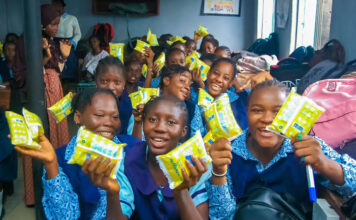Clina-Lancet Laboratories Nigeria, as part of its social responsibility and dedication to supporting the United Nations’ Sustainable Development Goal 3 (Good Health and Well-being), has supported the students of Queen’s College, Lagos, by donating sanitary pads and educational resources, promoting menstrual hygiene and education.
SDG Goal 3 aims to “ensure healthy lives and promote well-being for all ages.”
Clina-Lancet Laboratories Nigeria has taken a significant step towards achieving the universal health goal by providing essential support to the students of Queen’s College, Lagos.
The company recognizes that accessing quality healthcare is a fundamental right, and a critical aspect of this is ensuring menstrual hygiene.
Unfortunately, many girls in Nigeria struggle to access sanitary pads due to economic constraints, leading to unhygienic practices and absenteeism from school.
To address this, Clina-Lancet Laboratories Nigeria has donated over 3,000 sanitary pads to the students, alleviating the financial burden and promoting menstrual hygiene.
Dr. Olayemi Dawodu, the Managing Director, emphasized the importance of collaboration between the private sector and non-governmental organizations to make sanitary pads widely available for school girls in Nigeria, ensuring they can attend school with dignity and confidence.
Dawodu stated, “We believe that by working together with NGOs, civil organisations, and private companies, we can ensure all girls have access to menstrual hygiene and essential products.
“Menstrual hygiene is a crucial aspect of a girl’s overall health. Proper hygiene practices can significantly reduce the risk of infections and ensure girls can participate fully in school and daily activities.”
According to the National Library of Medicine, menstrual hygiene is the practice of managing menstruation in a way that is safe, hygienic, and culturally acceptable, with access to necessary facilities and services.
This includes using clean and absorbent materials to absorb menstrual blood, regularly changing and disposing of these materials, washing hands with soap and water, and having access to private and safe facilities for changing and disposal.
The United Nations Children’s Fund highlights the importance of good menstrual hygiene, noting that poor practices can lead to physical health risks, including reproductive and urinary tract infections.
Effective menstrual hygiene management is crucial for the health, well-being, and dignity of women and girls.
The “Pad Up a Girl” campaign, according to the managing director, seeks to educate and equip girls with the necessary tools to manage their menstruation with confidence and dignity.
The program covers various aspects of menstrual hygiene, including proper use of sanitary pads, maintaining personal hygiene, and addressing cultural stigmas surrounding menstruation.
Dr. Amaka Nwigwe, Wellness Occupational Manager for Clina-Lancet Laboratories, emphasized the significance of sanitary hygiene during health talks with the students.
She stressed that menstrual hygiene encompasses more than just personal cleanliness, highlighting the need for a comprehensive understanding of menstrual health and management.
“It also involves making sure that the girl child is comfortable and not embarrassed and confident to discuss menstruation and what happens to them, which is why a platform like this is a very laudable project.
“It creates an opportunity for discussions in the open. So, I’m just so glad that we did this today, and I’m sure that the impact that we had today will resonate in years to come”, she elaborated.
Ordering the company for the gesture, the Principal of Queen’s College, Lagos, Mrs. Oyindamola Obabori, represented by Vice Principal Student Affairs 1, Mrs Adebiyi Titilayo, highlighted, “We are grateful to Clina-lancet Laboratories for bringing this important initiative to our school.
“Equipping our girls with the knowledge and resources they need to manage their periods effectively is essential for their well-being and academic success.”
